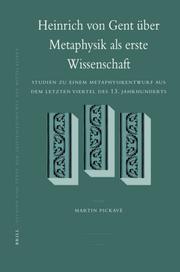| Listing 1 - 4 of 4 |
Sort by
|
Book
ISBN: 9783402103050 3402103052 9783402103067 Year: 2020 Publisher: Münster Aschendorff Verlag
Abstract | Keywords | Export | Availability | Bookmark
 Loading...
Loading...Choose an application
- Reference Manager
- EndNote
- RefWorks (Direct export to RefWorks)
Gegenstand dieser Arbeit ist der anthropologische Personenbegriff Heinrichs von Gent (vor 1240–1293). Die zentrale These lautet, Heinrich entwickele zwar keine geschlossene Theorie der menschlichen Person, verbinde aber ganz verschiedene philosophische Kontroversen seiner Zeit inhaltlich durch eine bestimmte Perspektive auf den Menschen in seinem Verhältnis zu Gott auf der einen Seite und der Natur auf der anderen Seite miteinander. Vor diesem Hintergrund widmet sich der Autor Heinrichs Beitrag zu den Fragen nach dem Prinzip der Individuation, der Ewigkeit der Welt sowie dem Verhältnis von Verstand und Wille. Im Zentrum der Darstellung steht hierbei jeweils, wie Heinrich zu seiner Positionierung unter Rückgriff auf verschiedene Autoritäten ein Konzept entwickelt, hinter dem eine scharfe Grenzziehung zwischen den Bereichen Gott, Mensch und Natur steht. Die Bestimmung dessen, wie der Mensch einerseits aus reinen Naturkategorien herausgehoben wird, wie zugleich aber vermieden werden muss, den Menschen selbst zu Gott werden zu lassen oder Gott in denselben Strukturen wie die von ihm geschaffene Natur zu verstehen, verknüpft Heinrich von Gent immer wieder mit dem Begriff Person. Sich als Person gegenüber Naturkausalitäten frei verhalten zu können, begründet für Heinrich die Würde einer Person. Die philosophiehistorisch angelegte Studie zeigt durch die direkte Auslegung der Quellentexte auf, wie Heinrich von Gent eine solche Position entwickelt: Einerseits durch Rückgriff auf verschiedene Traditionen und andererseits in Auseinandersetzung mit anderen Denkern seiner Zeit, allen voran Thomas von Aquin.
Theological anthropology --- 1 HENRICUS GANDAVENSIS --- 1 HENRICUS GANDAVENSIS Filosofie. Psychologie--HENRICUS GANDAVENSIS --- Filosofie. Psychologie--HENRICUS GANDAVENSIS --- Christianity --- History of doctrines --- Henry, --- Bonicollius, Henricus, --- Enrico, --- Enrique, --- Gandavo, Henricus a, --- Goethals a Gandavo, Henricus, --- Goethals, Henri, --- Heinrich, --- Hendrik, --- Henri, --- Henricus, --- Henricus Goethals, --- Henricus Mudanus, --- Henryk,
Book
ISBN: 9058673294 9789058673299 Year: 2003 Volume: 31 Publisher: Leuven Leuven University Press
Abstract | Keywords | Export | Availability | Bookmark
 Loading...
Loading...Choose an application
- Reference Manager
- EndNote
- RefWorks (Direct export to RefWorks)
Philosophy --- Henry of Ghent --- Filosofie van de Middeleeuwen --- Hendrik van Gent --- Henri de Gand --- Philosophie du Moyen Age --- Scholastiek --- Scolastique --- Henry, --- Scholasticism --- Philosophy, Medieval --- 1 HENRICUS GANDAVENSIS --- Academic collection --- Filosofie. Psychologie--HENRICUS GANDAVENSIS --- 1 HENRICUS GANDAVENSIS Filosofie. Psychologie--HENRICUS GANDAVENSIS --- Theology, Scholastic --- Bonicollius, Henricus, --- Enrico, --- Enrique, --- Gandavo, Henricus a, --- Goethals a Gandavo, Henricus, --- Goethals, Henri, --- Heinrich, --- Hendrik, --- Henri, --- Henricus, --- Henricus Goethals, --- Henricus Mudanus, --- Henryk, --- Scholasticism - Congresses --- Philosophy, Medieval - Congresses

ISBN: 9058675378 9789058675378 9789461660886 Year: 2006 Volume: 36 Publisher: Leuven University Press
Abstract | Keywords | Export | Availability | Bookmark
 Loading...
Loading...Choose an application
- Reference Manager
- EndNote
- RefWorks (Direct export to RefWorks)
The book elucidates Henry of Ghent's philosophical and theological system with special reference to his trinitarian writings. It demonstrates the fundamental role of the Trinity in Henry's philosophy and theology. It also shows how Henry (d. 1293), the most influential theologian of his day at Paris, developed the Augustinian tradition in seminal ways in response to the Aristotelian tradition, especially Thomas Aquinas (d. 1274).
Academic collection --- 1 HENRICUS GANDAVENSIS --- 1 HENRICUS GANDAVENSIS Filosofie. Psychologie--HENRICUS GANDAVENSIS --- Filosofie. Psychologie--HENRICUS GANDAVENSIS --- Henry of Ghent --- Trinity --- Philosophy, Medieval --- Henry, --- Theology, Doctrinal --- Triads (Philosophy) --- Appropriation (Christian theology) --- God (Christianity) --- Godhead (Mormon theology) --- Holy Spirit --- Trinities --- Tritheism --- Medieval philosophy --- Scholasticism --- Bonicollius, Henricus, --- Enrico, --- Enrique, --- Gandavo, Henricus a, --- Goethals a Gandavo, Henricus, --- Goethals, Henri, --- Heinrich, --- Hendrik, --- Henri, --- Henricus, --- Henricus Goethals, --- Henricus Mudanus, --- Henryk, --- Henry, - of Ghent, - 1217-1293

ISSN: 01698028 ISBN: 9789004155749 9004155740 9786611917135 1281917133 9047419073 9789047419075 9781281917133 6611917136 Year: 1950 Volume: 91 Publisher: Leiden Brill
Abstract | Keywords | Export | Availability | Bookmark
 Loading...
Loading...Choose an application
- Reference Manager
- EndNote
- RefWorks (Direct export to RefWorks)
The last 30 years have seen a revived interest in Henry of Ghent, one of the leading theologians at the University of Paris in the last quarter of the 13th century. This volume offers a new and comprehensive study of a central aspect of Henry’s philosophical thought: his understanding of metaphysics. The study examines why, according to Henry, there has to be a science investigating being qua being and how such an inquiry is at all possible. In Henry’s conception, metaphysics is not just one scientific discipline among others but the first and fundamental one for it deals with the first object of the intellect as its subject-matter. The recognition of this understanding, as the present study intends to show, opens a new perspective on the proper philosophical dimension of Henry of Ghent’s thought.
Henry of Ghent --- Metaphysics. --- Métaphysique --- Henry, --- Monographic series --- Human biochemistry --- 1 HENRICUS GANDAVENSIS --- 111 --- 111 Metafysica. Ontologie --- Metafysica. Ontologie --- God --- Ontology --- Philosophy --- Philosophy of mind --- 1 HENRICUS GANDAVENSIS Filosofie. Psychologie--HENRICUS GANDAVENSIS --- Filosofie. Psychologie--HENRICUS GANDAVENSIS --- Bonicollius, Henricus, --- Enrico, --- Enrique, --- Gandavo, Henricus a, --- Goethals a Gandavo, Henricus, --- Goethals, Henri, --- Heinrich, --- Hendrik, --- Henri, --- Henricus, --- Henricus Goethals, --- Henricus Mudanus, --- Henryk, --- Métaphysique --- Europa. Cultuurgeschiedenis. 5e-15e eeuw. (Reeks) --- Europa. Intellectueel leven. 5e-15e eeuw. (Reeks) --- Intellectueel leven. Geschiedenis. 5e-15e eeuw. (Reeks) --- Civilisation européenne. Histoire. 5e-15e s. (Collection) --- Civilisation médiévale. (Collection) --- Europe. Vie intellectuelle. 5e-15e s. (Collection) --- Vie intellectuelle. Histoire. 5e-15e s. (Collection) --- Cultuur (Middeleeuwse). (Reeks) --- Metaphysics --- Henry, - of Ghent, - 1217-1293.
| Listing 1 - 4 of 4 |
Sort by
|

 Search
Search Feedback
Feedback About UniCat
About UniCat  Help
Help News
News